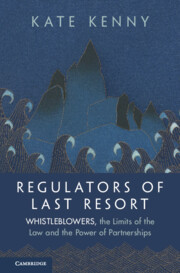
- Publisher:
- Cambridge University Press
- Online publication date:
- December 2024
- Print publication year:
- 2024
- Online ISBN:
- 9781009425629

How do public whistleblowers prevail despite employers' attempts to silence them? Whistleblowing is essential for raising awareness of extreme wrongdoing within organizations yet, despite changing laws designed to offer more protection, workers exposed for public disclosures frequently find themselves the targets of extreme retaliation. Featuring high-profile cases from Amazon, Facebook and Theranos, Kate Kenny reveals the critical - and often unseen - role that skilled allies play in supporting whistleblowers when official channels fail. Novel and sophisticated means of silencing require new strategies for whistleblowing – and supportive partners are key. In this new era of whistleblowing, oppressive lawfare is used against truth-telling workers, and official channels can be weaponized. Yet powerful employers can still make mistakes. Regulators of Last Resort shows how aggressive reprisals can yield surprising advantages for dissenters. Working in partnership with advocates, public whistleblowers can find strategies to survive, persist and bring their disclosures to light.
‘Organizational misbehaviour is a relatively frequent occurrence. So is attention to whistleblowers that articulate such misbehaviour and are frequently punished for doing so. Reducing the risk of individual punishment and increasing the public stigmatization of organizational misbehaviour is the aim of Kate Kenny’s extremely well-researched and written book. It shows how social networks can support lone voices of dissent and truthfulness in the face of misbehaviour by organizational elites. It provides sound advice for everyday democratic activism.’
Stewart Clegg - Professor, School of Project Management, University of Sydney and Emeritus Professor, University of Technology Sydney
‘Kenny’s book reveals that the power of a whistleblower to successfully expose and prevent serious wrongdoing and threats to the public interest - and to survive the experience - comes not merely from an individual’s truthful information and moral courage, but from the support of experts that individual receives in the process. This book is a gift to not just the literature on whistleblowing but to those of us working in the trenches of whistleblower legal support and advocacy to protect whistleblowers and ensure their disclosures makes a difference.’
Dana L. Gold - Senior Director of Advocacy & Strategy and Director of Democracy Protection Initiative, Government Accountability Project
‘This book is both engaging and accessible. Well-known whistleblower stories are used to highlight important issues that have not been explored thoroughly to date.’
Lauren Kierans - Lecturer in Law, Maynooth University, Co-Founder & Director of Education, European Whistleblowing Institute and Barrister-at-Law
‘This book confirms that Professor Kenny is one of the leading researchers on whistleblowing. The work covers the different aspects of a whistleblowing journey that, taken together, form the beginning of what she describes as the organizing practices of public whistleblowing. The chapters draw throughout on academic research and theory and will be of immense value to those teaching and studying in the area.’
David Lewis - Professor of Employment Law, Middlesex University and Convenor of the International Whistleblowing Research Network
‘This book tackles a crucially important topic, offering deep insights in an accessible style. Real-life whistleblower narratives are used effectively to develop new ideas, making the book readable, informative and motivating. Kate Kenny’s deep knowledge of the field is clear.’
Brian Martin - Emeritus Professor, University of Wollongong and Vice President, Whistleblowers Australia
‘Whistleblowing is in rapid evolution, with new laws, directives and public recognition to empower whistleblowers - yet the whistleblowing act remains fraught with risks and uncertainties. Professor Kenny, a leading theorist and practitioner of whistleblowing, draws a fascinating and insightful picture of the current state of whistleblower threats and opportunities. This book is essential reading for anyone who needs to understand the most significant recent whistleblower cases, and their place in the future of whistleblowing theory and practice.’
Tom Mueller - Ph.D., author of Crisis of Conscience: Whistleblowing in an Age of Fraud (Penguin Random House 2019)
‘Frankly, this is the book on whistleblowing that I wish I had written. Professor Kenny gets to the heart of the issues at play by examining how and why organisations and those who work for them go after some (but not all) whistleblowers with such vengeance even when those whistleblowers are a) just doing their jobs and b) right to raise the alarm. It is the precarious fault line between information control and democratic accountability whistleblowers are forced to work. Their capacity to make a difference and survive the process depends on them understanding how power works, and accessing the strategic support they need. It is the reason I do the work I do and I hope more will do in future.’
Anna Myers - Executive Director, WIN
 Loading metrics...
Loading metrics...
* Views captured on Cambridge Core between #date#. This data will be updated every 24 hours.
Usage data cannot currently be displayed.